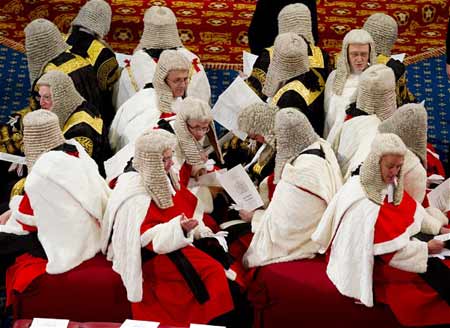|
 |
|
Fathers will be able to share parental leave to care for babies and will have greater access to their children after couples divorce, under government plans. David Cameron and Nick Clegg promised “unprecedented support for parents” with a new Children and Families Bill, which also contained measures to make it easier to adopt, and more support for children with special needs. Parents’ groups “cautiously welcomed” the proposals but business leaders warned that making parental leave more flexible would impose complex “burdens” on employers. Officials said current rules on maternity and paternity leave were “outdated” because they presumed that women will do the “vast majority” of caring for infants. A spokesman for the Department for Business said: “Parents should be able to choose their childcare arrangements for themselves.” There were few details about how the new flexible parental leave arrangements could work. Possible options include allowing mothers to return to work and transfer up to nine months of a year’s parental leave to fathers. However, business groups criticised the move. John Longworth, director general of the British Chambers of Commerce, warned that companies would face “endless” legal challenges and grievances resulting from “gender-neutral” parental leave. “Ministers have chosen to ignore the fact that a complex new system of shared parental leave brings fiendish complexity and huge uncertainty for employers,” he said. “These proposals will hit business at precisely the time ministers are asking companies to create jobs and spur growth. “While most businesspeople identify with the idea of gender-neutral parental leave, they’ve warned time and again that the Government’s proposals are unwieldy, difficult to understand and fraught with potential complications.” Simon Walker, Director General of the Institute of Directors, also warned that allowing parental leave to be shared risked adding to the burden on companies. “The Government should be careful not to use this as an opportunity to increase levels of leave,” he said. “Sharing the allowance is fine, but putting heavier burdens on business in these tough times would not be a sensible move.” (Read by Emily Cheng. Emily Cheng is a journalist at the China Daily Website.) (Agencies) |
根據(jù)英國(guó)政府的計(jì)劃,英國(guó)的父親們將能共享產(chǎn)假,照看寶寶,離婚后也將獲得更多陪伴孩子的機(jī)會(huì)。 英國(guó)首相大衛(wèi)?卡梅倫和副首相尼克?克萊格承諾將頒布一項(xiàng)兒童與家庭新法案,“為父母?jìng)兲峁┣八从械闹С帧薄7ò钢羞€包含讓收養(yǎng)孩子變得更容易、以及對(duì)有特殊需要的孩子提供更多支持的舉措。 父母群體對(duì)這一提案“有所保留地表示歡迎”,但企業(yè)主們警告說(shuō)讓產(chǎn)假變得更靈活將給雇主們帶來(lái)復(fù)雜的問(wèn)題,造成負(fù)擔(dān)。 政府官員稱(chēng),當(dāng)前的產(chǎn)假規(guī)定已經(jīng)“過(guò)時(shí)了”,因?yàn)榕f法規(guī)想當(dāng)然地認(rèn)為女性將承擔(dān)照顧嬰兒的“絕大部分工作”。 英國(guó)商業(yè)部的一位發(fā)言人說(shuō):“父母應(yīng)該能自主安排誰(shuí)來(lái)照顧小孩。” 關(guān)于靈活的新產(chǎn)假相關(guān)安排如何運(yùn)作,并未透露多少細(xì)節(jié)。也許會(huì)允許母親回到工作崗位,并且最多能將9個(gè)月的假期轉(zhuǎn)讓給父親。 但是,商業(yè)群體批評(píng)了這一舉動(dòng)。英國(guó)商會(huì)的總會(huì)長(zhǎng)約翰?朗沃斯警告說(shuō),公司將會(huì)因“不分性別的”產(chǎn)假而面臨“無(wú)休止的”法律挑戰(zhàn)和申訴。 他說(shuō):“復(fù)雜的產(chǎn)假共享新體系將給雇主們帶來(lái)極其糟糕的復(fù)雜狀況和非常大的不確定性,而部長(zhǎng)們選擇忽視這一事實(shí)。就在部長(zhǎng)們讓企業(yè)創(chuàng)造就業(yè)機(jī)會(huì)、刺激經(jīng)濟(jì)增長(zhǎng)的同時(shí),這些提案卻會(huì)對(duì)企業(yè)造成打擊。” “盡管大多數(shù)商界人士認(rèn)同產(chǎn)假不分性別的想法,但他們已經(jīng)屢次得到告誡,知道政府的提案施行起來(lái)很麻煩,難以理解,而且暗藏許多糾葛。” 英國(guó)董事學(xué)會(huì)的總會(huì)長(zhǎng)西蒙?沃克也警告說(shuō),讓父母親共享產(chǎn)假將可能增加企業(yè)的負(fù)擔(dān)。 他說(shuō):“政府應(yīng)該注意別讓這個(gè)新產(chǎn)假方案成為人們?cè)黾有菁俚臋C(jī)會(huì)。共享產(chǎn)假很好,但是在這樣的艱難時(shí)期讓企業(yè)背上更沉重的負(fù)擔(dān)不是一個(gè)明智之舉。” 相關(guān)閱讀 歐盟:產(chǎn)婦每天應(yīng)有兩小時(shí)哺乳假 日本區(qū)長(zhǎng)帶頭休產(chǎn)假 鼓勵(lì)生育 英國(guó):產(chǎn)假延長(zhǎng) 企業(yè)叫苦不迭 (中國(guó)日?qǐng)?bào)網(wǎng)英語(yǔ)點(diǎn)津 陳丹妮 編輯:Julie) |
|
Vocabulary: fiendish: 極壞的 unwieldy: 不靈便的;使用不便的 |
